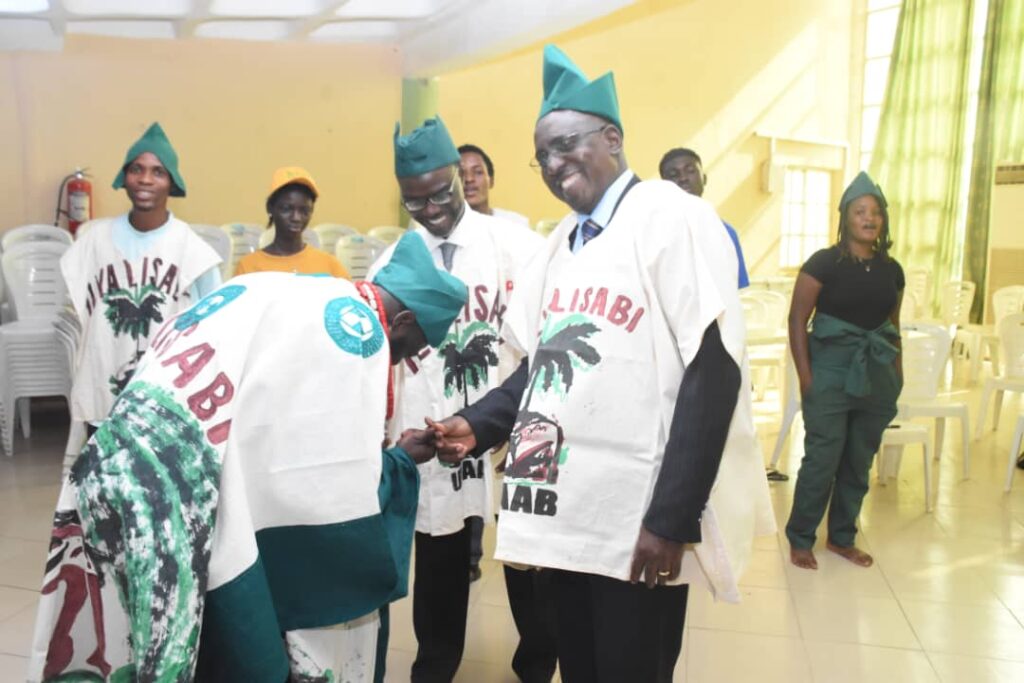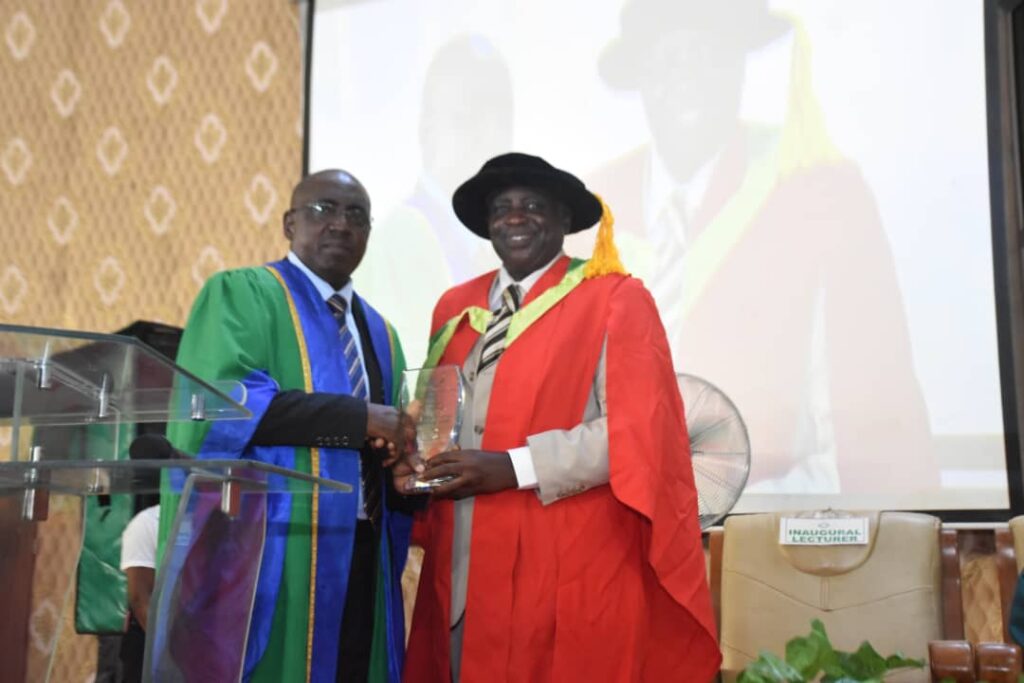The University’s Vice-Chancellor, Professor Kolawole Salako has appraised FUNAAB’s Thirty Years of existence declaring that the institution has contributed to the transformation agenda of successive Federal Government, especially in the area of agriculture.
Professor Salako who disclosed this at a Press Conference commemorating the University 30th Anniversary Celebrations attributed FUNAAB’s contributions to nation building to her unwavering commitment to setting and achieving unprecedented goals in academic and research activities.
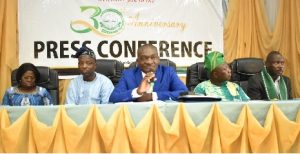
He pointed out that in the years ahead of her 30th anniversary, the University won’t relent in propelling the education sector and the nation in general to greater heights through mapping and implementation of lofty goals in academic and research activities.
According to him, the University is known throughout Africa as a leading champion of food security, environmental resources and agricultural research through its research engagement with national and international stakeholders, stressing that it is the lead implementing partner to Bill and Melinda Gates Foundation-sponsored project tagged “Cassava: Adding Value for Africa (CAVA2)” in Nigeria, Malawi, Uganda, Tanzania and Ghana in collaboration with her technical partners, NRI, UK and International Institute of Tropical Agriculture, Ibadan (IITA).
Highlighting some of the University’s commercialized research outputs, the Vice-Chancellor said they include FUNAAB Fufu, FUNAAB Alpha Broilers, Honey Bee Products, FUNAAB Cashew Nuts, FUNAAB Palm wine, Value Added Rabbit Product, Locally Sourced Passion Fruit, FUNAAB Textiles and Woodcraft, Medicinal Plant Products, and Value-added Products (Cosmetics).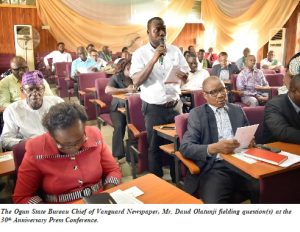
Professor Salako who pointed out that the University has come a long way from infancy to becoming a mature institution to be reckoned with, traced her root from the cradle to where it is today, in addition to taking stock of its outstanding achievements, her share of setbacks and shortcomings, as well as its future aspirations.
According to him, the Federal University of Agriculture, Abeokuta, Ogun State (FUNAAB), a specialized university, was established on January 1, 1988 by the Federal Government when four Universities of Technology, earlier merged in 1984, were demerged. This led to the creation of the first two Universities of Agriculture in Abeokuta and Makurdi.
Professor Nurudeen Olorun-Nimbe Adedipe was appointed as the pioneer Vice-Chancellor of the University. Prior to the emergence of FUNAAB, the Federal Government had established the Federal University of Technology, Abeokuta (FUTAB) in 1983. Then, in 1984, it was merged
with the University of Lagos and had its name changed to the College of Science and Technology, Abeokuta (COSTAB), before the demerger of January, 1988.
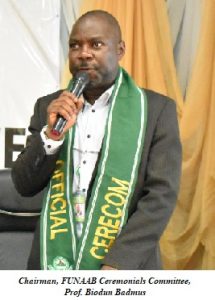 Professor Salako recalled that the University started off from the old campus of Abeokuta Grammar School, Isale-Igbein, near the city centre. It completed its movement to its Permanent Site along Alabata Road in 1997.
Professor Salako recalled that the University started off from the old campus of Abeokuta Grammar School, Isale-Igbein, near the city centre. It completed its movement to its Permanent Site along Alabata Road in 1997.
The five Colleges that were introduced in the University in October 1988, were College of Agricultural Management, Rural Development and Consumer Studies (COLAMRUCS); College of Animal Science and Livestock Production (COLANIM); College of Environmental Resources Management (COLERM); College of Natural Sciences (COLNAS); and College of Plant Science and Crop Production (COLPLANT).
Two additional Colleges, College of Engineering (COLENG) and College of Veterinary Medicine (COLVET) were introduced in March 2002. In the 2008/2009 Academic Session, the College of Agricultural Management, Rural Development and Consumer Studies was split into two with two Colleges emerging, as College of Food Science and Human Ecology (COLFHEC); and College of Agricultural Management and Rural Development (COLAMRUD).
College of Management Sciences (COLMAS) came on board in 2010. In the 2014/2015 Academic Session, the College of Natural Sciences (COLNAS) metamorphosed into the Colleges of Biosciences (COLBIOS); and Physical Sciences (COLPHYS), respectively.
Speaking on academic development/ and programmes, Professor Salako said the University has since grown and now runs 179 academic programmes comprising 29 undergraduate programmes and 109 graduate programmes (which include 23 Postgraduate diploma programmes, 44 Master’s degree programmes and 42 Doctorate degree programmes) in 47
Departments and 10 Colleges.
Shedding light on notable achievements in FUNAAB, the Vice-Chancellor said as a centre for academic excellence, the Federal University of Agriculture, Abeokuta, has through its relentless efforts, earned several accolades such as Best University in Nigeria in 2005 by the National Universities Commission (NUC); National Universities Commission’s First Place Prize as the Best Research University (2004 and 2005); Best University in Nigeria in October 2008 by the Industrial Training Fund (ITF); Best University for Student Industrial Work Experience Scheme (SIWES) Programme; World Bank Step-B Project (2007-2009); maiden Award as the Best in mathematics at the 1st National Mathematics Competition and the World Bank Africa Centre of Excellence in Agriculture.
Others include the Second Best University in Nigeria, out of 120 Universities in the country and 29th among 814 higher institutions in Africa in 2013 Webometrics Ranking of World Universities. With this ranking, FUNAAB was rated the Best University of Agriculture in Africa and 8th Best in the world.
In 2014, the World Bank Centre of Excellence for Agricultural Development and Sustainable Environment (CEADESE) was established in the University. Also, the University won $18.8m from the Bill and Melinda Gates Foundation for the Cassava Adding Value for Africa Phase II (CAVA).
The Vice-Chancellor noted that the benefits of the project to the nation include contributing to the agricultural component of the transformation agenda of the Federal Government. Increasing the income of at least 200,000 smallholder farmers and sustainable value added cassava chains in the five (5) Sub-Sahara African countries: Nigeria, Ghana, Tanzania, Uganda and Malawi. He added that this is also expected to bring about the socio-economic transformation of affected nations by stimulating employment, foreign earnings and producing favourable balance of payment through remarkable reduction in the importation of goods into the countries. It will also confer on the University a leadership role in cassava production and value addition in Africa.
Speaking on the University’s activities on extension and community engagement, Professor Salako disclosed that the University recently donated the sum of N15 million towards the construction of a Police Station in one of the adjoining communities as part of her Corporate Social Responsibility, while other intervention efforts have also been made to strengthen the security of lives and properties in the adjoining communities.
The Vice-Chancellor disclosed that his achievement in office in the last five months include smooth accreditation process by the National Universities Commission (NUC) and other professional bodies like Council for the Regulation of Engineering in Nigeria (COREN) in the last quarter of 2017.
The University also successfully completed examinations for the 2016/2017 Academic Session for undergraduate, postgraduate and part-time programmes in January and February 2018 thereby making it possible for graduates of the University to join Batch A Stream of the National Youth Service Corp (NYSC) in 2018; improved Internet Access, enhanced Staff Welfare, better prospects for grants and endowments; successful holding of inaugural lectures; successful election of Students’ Union Executives and representatives to their Legislative and enhanced student welfare; take off of the test-transmission of FUNAAB Radio on 89.5 FM and the acquisition of a Block Making Machine donated by the Minister of Agriculture, Chief Audu Ogbe, through the intervention of the Council Chairman, Dr. (Barr.) Aboki Zhawa.
Speaking on challenges facing the University, Professor Salako said they are in the areas of Human Resources; Water, Electricity and Road; Teaching, Agricultural and Laboratory Facilities; Hostel Facilities and Unstable Academic Calendar.
Restating a twelve-point agenda which he presented during his inauguration on November 1, 2017, the Vice-Chancellor said it includes providing leadership through democracy, diligence and discipline; promotion of research and scholarship; teaching and learning environment, entrepreneurship; community development; infrastructural development and maintenance of health services and sports; security and information dissemination; virile staff unions and welfare, student union and welfare and income generation and fund-raising.
Other Related Posts
- Health Awareness for Drivers
- VARSITIES’ RANKING FUNAAB Bounces Back To Top Ten
- VC Welcomes FUNAAB WAUG Heroes …Presents Medals, Commends Athletes
- FUNAAB Embraces FG Initiative on Power





